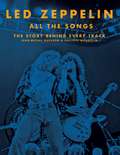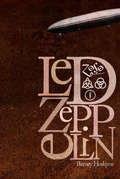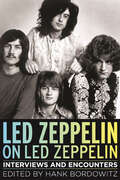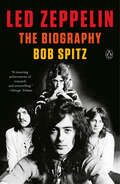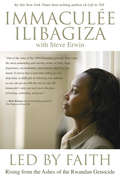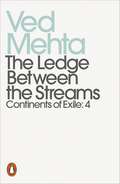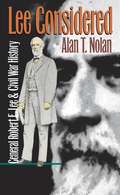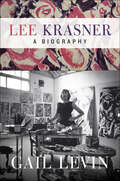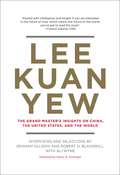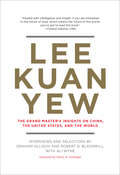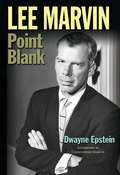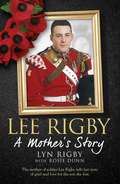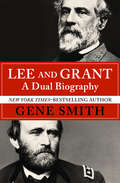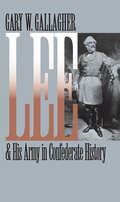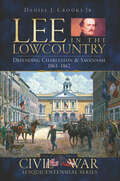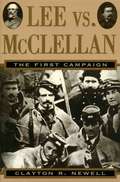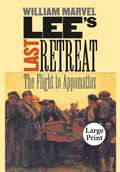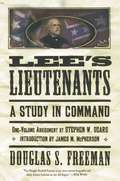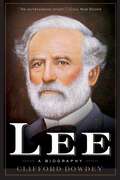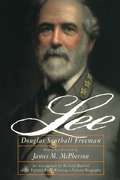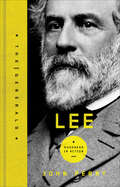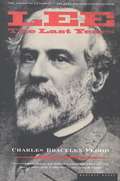- Table View
- List View
Led Zeppelin All the Songs: The Story Behind Every Track (All The Songs Ser.)
by Jean-Michel Guesdon Philippe MargotinTake a deep dive into the innovative recording history of Led Zeppelin, in this newest addition to the fan-favorite All the Songs series.Fifty years after their first practice in a Soho basement, Led Zeppelin continues to fascinate new generations of listeners. While their legendary back-stage debauchery has been written about extensively in other books, All the Songs is all about the music, detailing the studio magic and inspiration that made all nine albums go platinum, including Led Zeppelin IV which was certified x23 platinum and has sold more than 37 million copies worldwide. Studio stories will include their productive time at Headley Grange in Wales, a poorly-heated former poorhouse where they recorded parts of Led Zeppelin III, Led Zeppelin IV, Houses of the Holy and Physical Graffiti. And how the first album was recorded in three weeks but their second took six months, done while the band was on a world tour. They carried the masters of the recording session in a steamer trunk wherever they went. Out of these chaotic sessions came the "Whole Lotta Love," which was finished in New York with Hendrix engineer Eddie Kramer helping create the psychedelic middle part, as well as "The Lemon Song," which was cut live in the studio. Page worked feverishly with Kramer to mix the LP on a primitive 12-channel Altec board in a two-day span. Fans will also learn the genesis of their lyrics, the inspiration for their album covers, the instruments used, and the contributions of engineers such as Andy Johns, who helped create the iconic drum sound on "When the Levee Breaks" by recording Bonham at the bottom of a stairwell.
Led Zeppelin IV (Rock Of Ages Ser.)
by Barney HoskynsLed Zeppelin IV, often called heavy metal's greatest album, kicks off an exciting new series that takes a fresh, in-depth look at some of the greatest works from the most influential artists of the rock era. Fans may know the songs, but wait until they hear the stories behind them!The music contained in Led Zeppelin IV is part of the soundtrack to a generation. Released in 1971, it rocks, stomps, glides, and shimmers as it covers all the bases the band had mastered: heavy blues, barroom rock and roll, mandolin-driven folk, epic Tolkien-infused mysticism, acoustic Americana, and more. Certified gold one week after its release, the album went to #2 on the U.S. charts and #1 in the U.K. It remained on U.S. charts for 259 weeks. There probably isn't an aspiring rock guitarist anywhere who hasn't plucked out the notes and chords to "Stairway to Heaven" or "Black Dog," and yet many music lovers are unaware of the intriguing backstory to this genre-defining work.To this day there is confusion about what is the actual title of the album. And what about those mysterious symbols? Barney Hoskyns pierces those veils and more as he tells the fascinating story of the evocative set that cemented Led Zeppelin's standing as the biggest, baddest, loudest band in the world—and that remains today the apex of their art.
Led Zeppelin on Led Zeppelin: Interviews and Encounters
by Hank BordowitzIn a series of more than 50 interviews that span seven decades, many never before seen in print, this is the story of Led Zeppelin told by the people who knew it best--the members of the band. This book shoots down the folklore and assumptions about Jimmy Page, Robert Plant, John Paul Jones, and John Bonham, and presents the band's full history, from when Jimmy Page was playing skiffle to the day the band was honored by the Kennedy Center for their contribution to American and global culture. Led Zeppelin on Led Zeppelin captures the ideas of all of the band's members at the time they created classics like "Whole Lot of Love," "Stairway to Heaven," and "Kashmir," but also captures the idea of the band itself as it created the music that changed popular culture.
Led Zeppelin: The Biography
by Bob Spitz&“In this authoritative, unsparing history of the biggest rock group of the 1970s, Spitz delivers inside details and analysis with his well-known gift for storytelling.&” —PEOPLEFrom the author of the iconic, bestselling history of The Beatles, the definitive account of arguable the greatest rock band of all time.Rock star. Whatever that term means to you, chances are it owes a debt to Led Zeppelin. No one before or since has lived the dream quite like Jimmy Page, Robert Plant, John Paul Jones, and John Bonham. In Led Zeppelin, Bob Spitz takes their full measure, separating myth from reality with his trademark connoisseurship and storytelling flair.From the opening notes of their first album, the band announced itself as something different, a collision of grand artistic ambition and brute primal force, of English folk music and African American blues. Spitz&’s account of their artistic journey, amid the fascinating ecosystem of popular music, is irresistible. But the music is only part of the legend: Led Zeppelin is also the story of how the sixties became the seventies, of how innocence became decadence, of how rock took over. Led Zeppelin wasn&’t the first band to let loose on the road, but as with everything else, they took it to an entirely new level. Not all the legends are true, but in Spitz&’s careful accounting, what is true is astonishing and sometimes disturbing.Led Zeppelin gave no quarter, and neither has Bob Spitz. Led Zeppelin is the long-awaited full reckoning the band richly deserves.
Led by Faith: Rising from the Ashes of the Rwandan Genocide
by Immaculee IlibagizaFor three months in the spring of 1994, the African nation of Rwanda descended into one of the most vicious and bloody genocides the world has ever seen. Immaculée Ilibagiza, a young university student, miraculously survived the savage killing spree that left most of her family, friends, and a million of her fellow citizens dead. Her remarkable story of survival was documented in her first book, Left to Tell: Discovering God Amidst the Rwandan Holocaust. In Led By Faith, Immaculée takes us with her as her remarkable journey continues. Through her simple and eloquent voice, we experience her hardships and heartache as she struggles to survive and to find meaning and purpose in the aftermath of the holocaust. It is the story of a naïve and vulnerable young woman, orphaned and alone, navigating through a bleak and dangerously hostile world with only an abiding faith in God to guide and protect her. Immaculée fends off sinister new predators, seeks out and comforts scores of children orphaned by the genocide, and searches for love and companionship in a land where hatred still flourishes. Then, fearing again for her safety as Rwanda&’s war-crime trials begin, Immaculée flees to America to begin a new chapter of her life as a refugee and immigrant—a stranger in a strange land. With the same courage and faith in God that led her through the darkness of genocide, Immaculée discovers a new life that was beyond her wildest dreams as a small girl in a tiny village in one of Africa&’s poorest countries. It is in the United States, her adopted country, where Immaculée can finally look back at all that has happened to her and truly understand why God spared her life . . . so that she would be left to tell her story to the world.
Ledge Between the Streams: Continents of Exile: 4 (Penguin Modern Classics)
by Ved MehtaBook 4 in Ved Mehta's Continents of Exile series. Nearly 50 years in the making, Continents of Exile is one of the great works of twentieth-century autobiography: the epic chronicle of an Indian family in the twentieth century. From 1930s India to 1950s Oxford and literary New York in the 1960s-80s, this is the story of the post-colonial twentieth century, as uniquely experienced and vividly recounted by Ved Mehta.Set against the distant storm of the Second World War and the waning light of British Raj, Ved Mehta's brilliant memoir Ledge Between the Streams tells of an Indian childhood and the coming to terms with growing blindness: how, despite his disability, he learned English, Braille, horseback riding, bicycling, touch typing, and roller skating.
Lee (With Photographs and Maps)
by Clifford DowdeyThe author presents a detailed account of the biography of Robert E. Lee and the Civil War.
Lee Considered
by Alan T. NolanOf all the heroes produced by the Civil War, Robert E. Lee is the most revered and perhaps the most misunderstood. Lee is widely portrayed as an ardent antisecessionist who left the United States Army only because he would not draw his sword against his native Virginia, a Southern aristocrat who opposed slavery, and a brilliant military leader whose exploits sustained the Confederate cause. Alan Nolan explodes these and other assumptions about Lee and the war through a rigorous reexamination of familiar and long-available historical sources, including Lee's personal and official correspondence and the large body of writings about Lee. Looking at this evidence in a critical way, Nolan concludes that there is little truth to the dogmas traditionally set forth about Lee and the war.
Lee Krasner: A Biography
by Gail LevinA “compelling” biography of the brilliant abstract expressionist painter who was far more than just Mrs. Jackson Pollock (Los Angeles Times).Lee Krasner is best known as the artist-wife of Jackson Pollock, the renowned abstract expressionist painter. Yet in this riveting biography, the first full-length account of her colorful life, Krasner emerges as a significant artist who deserves her place in the twentieth century’s cultural lexicon.In this captivating book, art historian Gail Levin probes Krasner’s relationship with Pollock, examining how this strong woman struggled to meet the challenges of their poverty, as well as her husband’s alcoholism and extramarital affair, all the while encouraging his art. Drawing on new sources and numerous personal interviews—including with Krasner herself—Levin has written a dynamic and moving portrait of a brilliant woman, a most welcome work that recovers Krasner’s voice and allows us to understand how her life intersected with and informed her art.
Lee Kuan Yew
by Robert D. Blackwill Graham AllisonWhen Lee Kuan Yew speaks, presidents, prime ministers, diplomats, and CEOs listen. Lee, the founding father of modern Singapore and its prime minister from 1959 to 1990, has honed his wisdom during more than fifty years on the world stage. Almost single-handedly responsible for transforming Singapore into a Western-style economic success, he offers a unique perspective on the geopolitics of East and West. American presidents from Richard Nixon to Barack Obama have welcomed him to the White House; British prime ministers from Margaret Thatcher to Tony Blair have recognized his wisdom; and business leaders from Rupert Murdoch to Rex Tillerson, CEO of Exxon Mobil, have praised his accomplishments. This book gathers key insights from interviews, speeches, and Lee's voluminous published writings and presents them in an engaging question and answer format. Lee offers his assessment of China's future, asserting, among other things, that "China will want to share this century as co-equals with the U.S." He affirms the United States' position as the world's sole superpower but expresses dismay at the vagaries of its political system. He offers strategic advice for dealing with China and goes on to discuss India's future, Islamic terrorism, economic growth, geopolitics and globalization, and democracy. Lee does not pull his punches, offering his unvarnished opinions on multiculturalism, the welfare state, education, and the free market. This little book belongs on the reading list of every world leader -- including the one who takes the oath of office on January 20, 2013.
Lee Kuan Yew: The Grand Master's Insights on China, the United States, and the World (Belfer Center Studies in International Security)
by Robert D. Blackwill Graham Allison Ali WyneGrand strategist and founder of modern Singapore offers key insights and controversial opinions on globalization, geopolitics, economic growth, and democracy. When Lee Kuan Yew speaks, presidents, prime ministers, diplomats, and CEOs listen. Lee, the founding father of modern Singapore and its prime minister from 1959 to 1990, has honed his wisdom during more than fifty years on the world stage. Almost single-handedly responsible for transforming Singapore into a Western-style economic success, he offers a unique perspective on the geopolitics of East and West. American presidents from Richard Nixon to Barack Obama have welcomed him to the White House; British prime ministers from Margaret Thatcher to Tony Blair have recognized his wisdom; and business leaders from Rupert Murdoch to Rex Tillerson, CEO of Exxon Mobil, have praised his accomplishments. This book gathers key insights from interviews, speeches, and Lee's voluminous published writings and presents them in an engaging question and answer format. Lee offers his assessment of China's future, asserting, among other things, that “China will want to share this century as co-equals with the U.S.” He affirms the United States' position as the world's sole superpower but expresses dismay at the vagaries of its political system. He offers strategic advice for dealing with China and goes on to discuss India's future, Islamic terrorism, economic growth, geopolitics and globalization, and democracy. Lee does not pull his punches, offering his unvarnished opinions on multiculturalism, the welfare state, education, and the free market. This little book belongs on the reading list of every world leader—including the one who takes the oath of office on January 20, 2013.
Lee Marvin
by Dwayne EpsteinThe first full-length, authoritative, and detailed story of the iconic actor's life to go beyond the Hollywood scandal-sheet reporting of earlier books, this account offers an appreciation for the man and his acting career and the classic films he starred in, painting a portrait of an individual who took great risks in his acting and career. Although Lee Marvin is best known for his icy tough guy roles—such as his chilling titular villain in The Man Who Shot Liberty Valance or the paternal yet brutally realistic platoon leader in The Big Red One—very little is known of his personal life; his family background; his experiences in WWII; his relationship with his father, family, friends, wives; and his ongoing battles with alcoholism, rage, and depression, occasioned by his postwar PTSD. Now, after years of researching and compiling interviews with family members, friends, and colleagues; rare photographs; and illustrative material, Hollywood writer Dwayne Epstein provides a full understanding and appreciation of this acting titan’s place in the Hollywood pantheon in spite of his very real and human struggles.
Lee Rigby: A Mother's Story
by Lyn Rigby Rosie DunnLyn Rigby's story charts the unfathomably difficult time she has endured since May 2013 when her son, 25-year-old Fusilier Lee Rigby, was butchered on a London high street by two British-born young men compelled to avenge the killing of Muslims by the British armed forces. The savage brutality of the killing shocked the nation, and the ramifications spread to the highest levels of government, questioning the security of social networking sites that allowed the fanatics who murdered her son to discuss their intentions online and unchecked. Lyn Rigby has questions for government and the military, but overall it is her story of sorrow, her campaign for a memorial dedicated to Lee's memory, her admiration for the 'angels of Woolwich' and, hopefully, belief that her son did not die in vain. She is writing this book as a tribute to Lee - to give him a voice and to tell his story not just as a soldier, but as a vibrant, happy young man with a son and a future that has been so cruelly and viciously been taken from him.
Lee and Grant: A Dual Biography
by Gene SmithAn enthralling and richly detailed biography of two gifted military commanders who changed the course of American history. Their names are forever linked in the history of the Civil War, but Robert E. Lee and Ulysses S. Grant could not have been more dissimilar. Lee came from a world of Southern gentility and aristocratic privilege while Grant had coarser, more common roots in the Midwest. As a young officer trained in the classic mold, Lee graduated from West Point at the top of his class and served with distinction in the Mexican-American War. Grant's early military career was undistinguished and marred by rumors of drunkenness. As commander of the Confederate Army of Northern Virginia, Lee's early victories demoralized the Union Army and cemented his reputation as a brilliant tactician. Meanwhile, Grant struggled mightily to reach the top of the Union command chain. His iron will eventually helped turn the tide of the war, however, and in April 1864, President Abraham Lincoln gave Grant command of all Union forces. A year later, he accepted Lee's surrender at the Appomattox Court House. With brilliance and deep feeling, New York Times-bestselling author Gene Smith brings the Civil War era to vivid life and tells the dramatic story of two remarkable men as they rise to glory and reckon with the bitter aftermath of the bloodiest conflict in American history. Never before have students of American history been treated to a more personal, comprehensive, and achingly human portrait of Lee and Grant.
Lee and His Army in Confederate History
by Gary W. GallagherWas Robert E. Lee a gifted soldier whose only weaknesses lay in the depth of his loyalty to his troops, affection for his lieutenants, and dedication to the cause of the Confederacy? Or was he an ineffective leader and poor tactician whose reputation was drastically inflated by early biographers and Lost Cause apologists? These divergent characterizations represent the poles between which scholarly and popular opinion on Lee has swung over time. Now, in eight essays, Gary Gallagher offers his own refined thinking on Lee, exploring the relationship between Lee's operations and Confederate morale, the quality of his generalship, and the question of how best to handle his legacy in light of the many distortions that grew out of Lost Cause historiography.Using a host of contemporary sources, Gallagher demonstrates the remarkable faith that soldiers and citizens maintained in Lee's leadership even after his army's fortunes had begun to erode. Gallagher also engages aspects of the Lee myth with an eye toward how admirers have insisted that their hero's faults as a general represented exaggerations of his personal virtues. Finally, Gallagher considers whether it is useful--or desirable--to separate legitimate Lost Cause arguments from the transparently false ones relating to slavery and secession. Was Robert E. Lee a gifted soldier whose only weaknesses lay in the depth of his loyalty to his troops, affection for his lieutenants, and dedication to the cause of the Confederacy? Or was he an ineffective leader and poor tactician whose reputation was drastically inflated by early biographers and Lost Cause apologists? These divergent characterizations represent the poles between which scholarly and popular opinion on Lee has swung over time. In eight essays, Gary Gallagher offers his own refined thinking on Lee, exploring the relationship between Lee's operations and Confederate morale, the quality of his generalship, and the question of how best to assess his legacy in light of the many distortions that grew out of Lost Cause historiography.-->
Lee in the Lowcountry: Defending Charleston & Savannah 1861–1862 (Civil War Ser.)
by Daniel J. Crooks Jr.This Civil War biography sheds light on the Confederate General&’s first year serving the newly formed Southern Republic. Early in the Civil War, General Robert E. Lee was given command of the Department of South Carolina, Georgia and East Florida. Making him, in effect, the first line of defense for for Confederacy and two of its key cities: Charleston and Savannah. In Lee in the Lowcountry, Charleston historian Danny Crooks examines this period in Lee&’s career, in which he faced with confusion and convoluted loyalty among the ranks. Using Lee&’s own words and those of his contemporaries, Crooks helps the reader to understand why Lee, and only Lee, could bring order to the early chaos of the war. He also reveals how Lee acquired the two most famous trademarks of his wartime career while in the Lowcountry. Long hours in the saddle prompted Lee to grow his signature beard and, while at Pocotaligo, he acquired his beloved equine companion, Traveller.
Lee vs. McClellan: The First Campaign
by Clayton R. NewellIn 1861, two brilliant but inexperienced generals faced off in the rugged mountains of western Virginia. Neither Robert E. Lee nor George B. McClellan had ever commanded an army before; but in the crucial first campaign of the bloody Civil War, both men were quickly put to the test. Lee vs. McClellan is a vivid, gripping account of this often-overlooked first campaign--a campaign that taught both North and South the grueling realities of war.
Lee's Lieutenants Third Volume Abridged: A Study in Command
by Douglas Southall FreemanLee's Lieutenants: A Study in Command is the most colorful and popular of Douglas Southall Freeman's works. A sweeping narrative that presents a multiple biography against the flame-shot background of the American Civil War, it is the story of the great figures of the Army of Northern Virginia who fought under Robert E. Lee.The Confederacy won resounding victories throughout the war, but seldom easily or without tremendous casualties. Death was always on the heels of fame, but the men who commanded -- among them Jackson, Longstreet, and Ewell -- developed as leaders and men. Lee's Lieutenants follows these men to the costly battle at Gettysburg, through the deepening twilight of the South's declining military might, and finally to the collapse of Lee's command and his formal surrender in 1865. To his unparalleled descriptions of men and operations, Dr. Freeman adds an insightful analysis of the lessons learned and their bearing upon the future military development of the nation. Accessible at last in a one-volume edition abridged by noted Civil War historian Stephen W. Sears, Lee's Lieutenants is essential reading for all Civil War buffs, students of war, and admirers of the historian's art as practiced at its very highest level.
Lee's Lieutenants: A Study in Command (Lee's Lieutenants: A Study In Command Ser. #3)
by Douglas Southall FreemanLee's Lieutenants: A Study in Command is the most colorful and popular of Douglas Southall Freeman's works. A sweeping narrative that presents a multiple biography against the flame-shot background of the American Civil War, it is the story of the great figures of the Army of Northern Virginia who fought under Robert E. Lee.The Confederacy won resounding victories throughout the war, but seldom easily or without tremendous casualties. Death was always on the heels of fame, but the men who commanded—among them Jackson, Longstreet, and Ewell—developed as leaders and men. Lee's Lieutenants follows these men to the costly battle at Gettysburg, through the deepening twilight of the South's declining military might, and finally to the collapse of Lee's command and his formal surrender in 1865. To his unparalleled descriptions of men and operations, Dr. Freeman adds an insightful analysis of the lessons learned and their bearing upon the future military development of the nation. Accessible at last in a one-volume edition abridged by noted Civil War historian Stephen W. Sears, Lee's Lieutenants is essential reading for all Civil War buffs, students of war, and admirers of the historian's art as practiced at its very highest level.
Lee: A Biography
by Clifford DowdeyGeneral Robert E. Lee is well known as a major figure in the Civil War. However, by removing Lee from the delimiting frame of the Civil War and placing him in the context of the Republic's total history, Dowdey shows the "eternal relevance" of this tragic figure to the American heritage. With access to hundreds of personal letters, Dowdey brings fresh insights into Lee's background and personal relationships and examines the factors which made Lee that rare specimen, "a complete person. ” In tracing Lee's reluctant involvement in the sectional conflict, Dowdey shows that he was essentially a peacemaker, very advanced in his disbelief in war as a resolution. Lee had never led troops in combat until suddenly given command of a demoralized, hodgepodge force under siege from McClellan in front of Richmond. In a detailed study of Lee's growth in the mastery of the techniques of war, he shows his early mistakes, the nature of his seemingly intuitive powers, the limitations imposed by his personal character and physical decline, and the effect of this character on the men with whom he created a legendary army. It was after the fighting was over that Dowdey believes Lee made his most significant and neglected achievement. As a symbol of the defeated people, he rose above all hostilities and, in the wreckage of his own fortunes, advocated rebuilding a New South, for which he set the example with his progressive program in education. The essence of Lee's tragedy was the futility of his efforts toward the harmonious restoration of the Republic with the dissensions of the past forgotten. Skyhorse Publishing, as well as our Arcade imprint, are proud to publish a broad range of books for readers interested in history--books about World War II, the Third Reich, Hitler and his henchmen, the JFK assassination, conspiracies, the American Civil War, the American Revolution, gladiators, Vikings, ancient Rome, medieval times, the old West, and much more. While not every title we publish becomes a New York Times bestseller or a national bestseller, we are committed to books on subjects that are sometimes overlooked and to authors whose work might not otherwise find a home.
Lee: A Biography
by Douglas Southall FreemanDouglas Southall Freeman's Pulitzer Prize-winning biography of Robert E. Lee was greeted with critical acclaim when it was first published in 1935. Stephen Vincent Benét said "There is a monument--and a fine one--to Robert E. Lee at Lexington. But this one, I think, will last as long." This reissue of Richard Harwell's abridgment fulfills Benét's prophecy, chronicling all the major aspects and highlights of the general's military career, from his stunning accomplishments in the Mexican War to the humbling surrender at Appomattox. More than just a military leader, Lee embodied all the conflicts of his time. The son of a Revolutionary War hero and related by marriage to George Washington, he was the product of young America's elite. When Abraham Lincoln offered him command of the United States Army, however, he choose to lead the confederate ranks, convinced that his first loyalty lay with his native Virginia. Although a member of the planter class, he felt that slavery was "a moral and political evil." Aloof and somber, he nevertheless continually inspired his men by his deep concern for their personal welfare. Freeman's achievement is the full portrait of a great American--a distinguished, scholarly, yet eminently readable classic that has linked Freeman to Lee as irrevocably as Boswell to Dr. Johnson.
Lee: Goodness in Action (The Generals Series)
by John PerryA biography of the often misunderstood, yet heroic, Confederate general who sacrificed everything for his native state of Virginia during the Civil War. Traitor. Divider. Defender of slavery. This damning portrayal of Robert E. Lee has persisted through 150 years of history books. And yet it has no basis in fact.In the spirit of bold restoration, Lee: A Life of Virtue reveals the true Lee—passionate patriot, caring son, devoted husband, doting father, don’t-tread-on-me Virginian, Godfearing Christian.Weaving forgotten facts and revelations (Lee considered slavery a moral outrage) with striking personal details (for years he carried his weakened mother to and from her carriage), biographer John Perry crafts a compelling treatment of the virtuous warrior who endured withering opposition and sacrificed all to stand for Constitutional freedoms.
Lee: The Last Years
by Charles Bracelen FloodA New York Times bestselling author&’s revealing account of General Robert E. Lee&’s life after Appomattox: &“An American classic" (Atlanta Journal-Constitution). After his surrender at Appomattox in 1865, Robert E. Lee, commanding general for the Confederate Army of Northern Virginia during the Civil War, lived only five more years. It was the great forgotten chapter of his remarkable life, during which Lee did more to bridge the divide between the North and the South than any other American. The South may have lost, but Lee taught them how to triumph in peace, and showed the entire country how to heal the wounds of war. Based on previously unseen documents, letters, family papers and exhaustive research into Lee&’s complex private life and public crusades, this is a portrait of a true icon of Reconstruction and quiet rebellion. From Lee&’s urging of Rebel soldiers to restore their citizenship, to his taking communion with a freedman, to his bold dance with a Yankee belle at a Southern ball, to his outspoken regret of his soldierly past, to withstanding charges of treason, Lee embodied his adage: &“True patriotism sometimes requires of men to act exactly contrary, at one period, to that which it does at another.&” Lee: The Last Years sheds a vital new light on war, politics, hero-worship, human rights, and Robert E. Lee&’s &“desire to do right.&”
Leer y escribir: Una versión personal
by V.S. NaipaulEn Leer y escribir, Naipaul pasa revista a su relación con la lectura y con el hecho de escribir. En esta breve narración, escrita desde la memoria más personal, el autor pasa revista a su relación con el libro y con el hecho de escribir. Desde sus primeras lecturas (por ejemplo, Veinte mil lenguas de viaje submarino) hasta su relación con la escritura y su concepción de la labor del escritor. Un texto sencillo en el que, partiendo de sus impresiones, el autor nos acerca sin ninguna dificultad a su mundo y a sus percepciones personales. Todo ello conforma el fresco de una vida dedicada a la escritura, desde los difíciles comienzos de la década de 1950 hasta la actualidad. La memoria de un aprendizaje interior y exterior que refleja las dificultades propias de haber vivido en una tradición básicamente oral como la cultura hindú. En unos tiempos en los que se cuestiona cuál es el papel de la lectura y la escritura en la vida de los seres humanos, V. S. Naipaul, premio Nobel de Literatura ofrece una respuesta personal, apasionada y original. Reseña:«Naipaul es el único gran escritor inglés que vale la pena leer.»Guillermo Cabrera Infante, El Cultural
